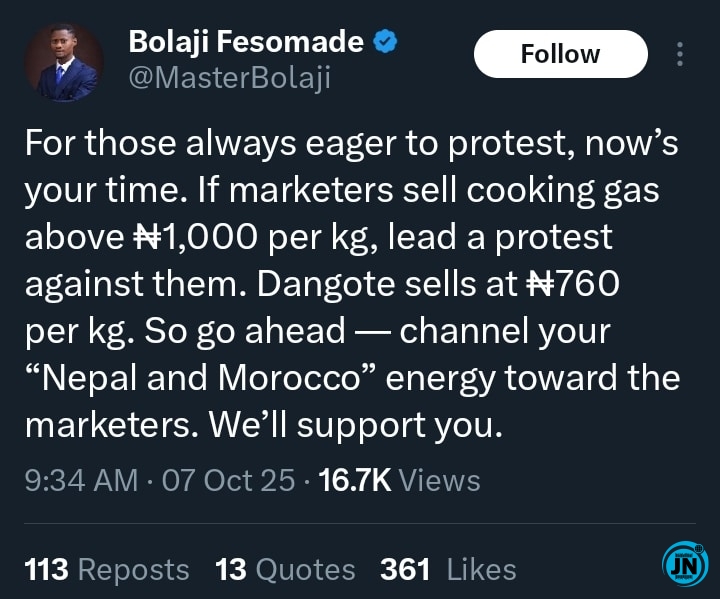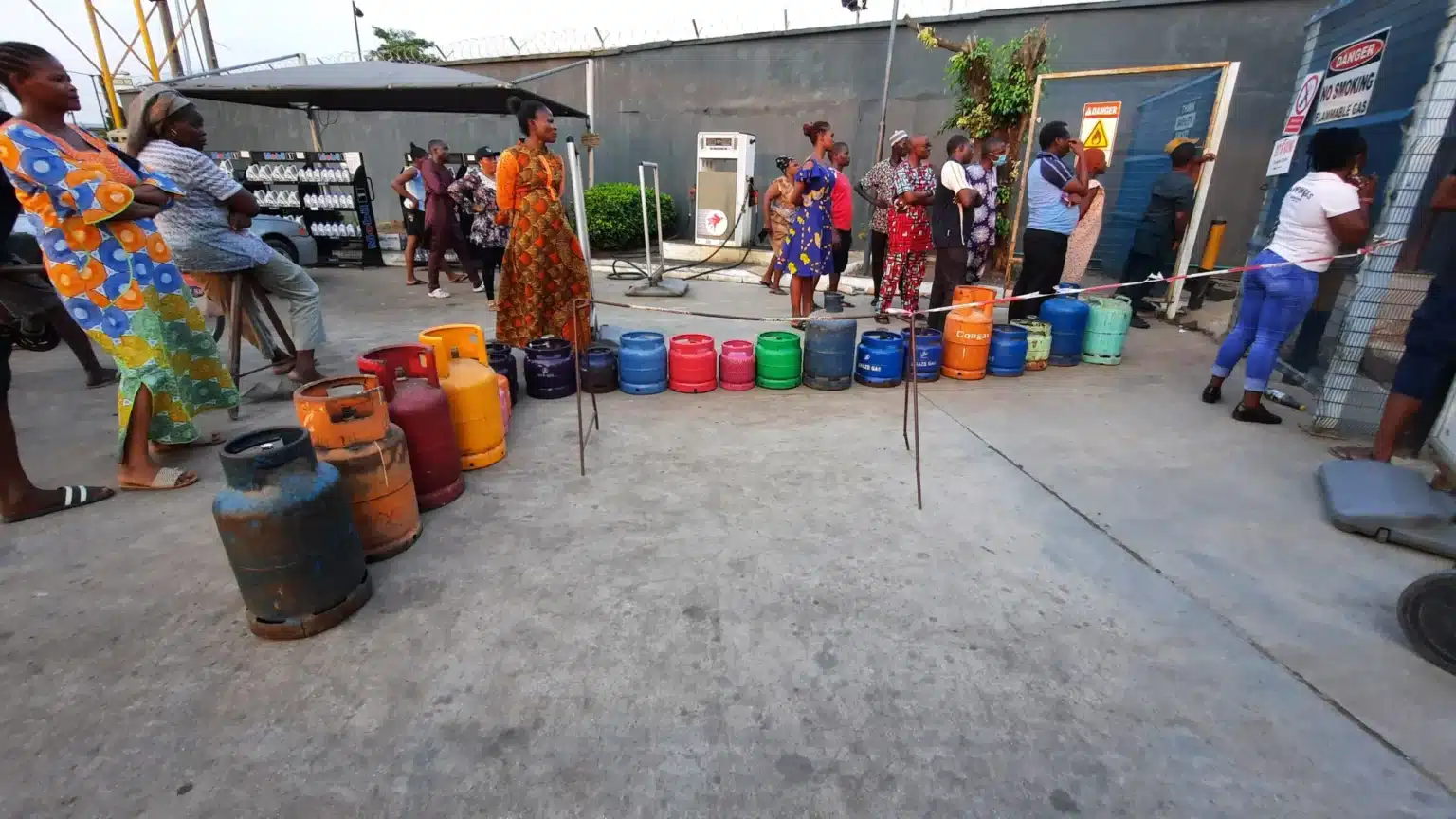A political economy analyst, Bolaji Fesomade, has sparked a nationwide conversation on social media after publicly calling for a protest against cooking gas marketers who continue to sell above ₦1,000 per kilogram. His post has ignited widespread debate, with many Nigerians expressing frustration over the increasing cost of essential commodities despite efforts by major producers to stabilize prices. The outspoken analyst made the statement on X (formerly Twitter), where he emphasized that citizens have the right and responsibility to demand fairness from sellers, especially when it comes to basic household needs like cooking gas.
Fesomade’s message resonated with thousands of users who have been complaining about the sudden surge in gas prices, which has worsened the economic hardship faced by many Nigerian families. He noted that the cost of living continues to rise uncontrollably due to artificial inflation by some marketers, even after the Dangote Refinery reportedly slashed its ex-depot price to ₦760 per kilogram. The analyst accused gas sellers of exploiting consumers by failing to reflect this reduction in their retail prices and urged the public to rise in unity to challenge this exploitation. According to him, Nigerians should no longer sit back in silence while businesses take advantage of them under the pretense of economic instability.
Call for protest
In his now-viral tweet, Fesomade wrote: “For those always eager to protest, now’s your time. If marketers sell cooking gas above ₦1,000 per kg, lead a protest against them. Dangote sells at ₦760 per kg. So go ahead — channel your ‘Nepal and Morocco’ energy toward the marketers. We’ll support you.” His statement, laced with both sarcasm and challenge, was interpreted by many as a call to action. He urged citizens who are quick to criticize the government to also direct their activism toward private businesses that engage in exploitative practices. Fesomade’s post essentially calls for accountability beyond government circles, emphasizing that corruption and greed in the private sector also contribute significantly to the suffering of ordinary Nigerians.

The call for protest immediately went viral, gaining traction across various online platforms. Many Nigerians agreed with his sentiments, acknowledging that gas prices had become unaffordable for the average household. Some users pointed out that while the Dangote Refinery’s price cut was meant to bring relief, many retailers have continued to hoard products or inflate prices for personal gain. The issue has become a major talking point as consumers question the effectiveness of market regulation and demand that authorities step in to ensure fair pricing across the supply chain. Others believe that a coordinated citizens’ protest could put pressure on gas marketers to lower their prices and act in line with market standards.
Nigerians react
Fesomade’s post sparked a flood of diverse reactions online, reflecting both support and skepticism. Francis Kotobo replied: “@MasterBolaji I support u on the protest against price hike not only on gas but also on all the items but why don’t u, I & others calling for such protest pick a date, time & venue to lead the protest. Let’s lead by example, let’s not push others while we hide behind our tweets. IRE O.” His message challenged Fesomade to lead the movement in person, emphasizing that real change requires more than social media outrage—it needs visible, collective action from citizens who are ready to confront the issue head-on.
Another commenter, Black Genius, took a more critical tone, writing: “🇳🇬ns are fraudulent in nature. We blame the politicians but we’re the same or worse. Even if Dangote sells to them at ₦200 per kg they won’t bring the price down. Anything that goes up in Nigeria hardly comes down. Awon oloriburuku thieves!” His comment resonated with those who believe that greed and dishonesty are not limited to political leaders but also deeply rooted in the everyday business culture of the country. Many Nigerians echoed this sentiment, lamenting that once prices increase, they rarely return to normal even after costs of production fall.

Adding to the discussion, Abubakar Ameen wrote: “People aren’t afraid to protest, they’re just tired of protesting against symptoms instead of the system. Fix the system, and the symptoms will fade.” His response introduced a broader perspective, arguing that while gas marketers should be held accountable, the deeper issue lies in Nigeria’s weak regulatory framework and systemic inefficiencies. According to Ameen, protesting against individual actors might offer temporary relief, but long-term stability can only come from structural reforms that tackle corruption, lack of oversight, and inconsistent pricing mechanisms.
Similarly, Materpieace pointed out the hypocrisy among citizens and the lack of accountability in the private sector. He wrote: “They can’t talk or even protest about this kind of thing because it doesn’t relate to criticizing the presidency. Nigerians doing businesses, especially the ones in the cooking gas sector, will never want this kind of news to be disclosed to the public, so they’ll keep making enormous gains using the strike as an excuse to inflict price increases as they already did in past few days.” His message accused business owners of taking advantage of national issues, such as labor strikes, to justify artificial price hikes that further burden the people.
In agreement with Fesomade’s stance, Seth Elisha commented: “I agreed, we cannot keep blaming the system while a few middlemen are holding us ransom. The marketers should be held responsible!!!” His reaction reflected the growing frustration among consumers who believe that some private entities are deliberately worsening the country’s economic situation for personal gain. According to Elisha and several others, the time has come for Nigerians to demand accountability not only from their government but also from businesses that directly affect their daily lives.
The debate continues to gain momentum online, with Nigerians divided over who should be the primary target of the protest—the marketers, the government, or both. Some argue that the government’s failure to enforce fair pricing laws has emboldened marketers to act without consequence, while others insist that citizens must take the lead in demanding transparency at all levels. As discussions intensify, many are calling for a collective movement that will address both systemic corruption and market exploitation, ensuring that the price of cooking gas—and other essentials—reflects true market conditions rather than the greed of a few powerful players.